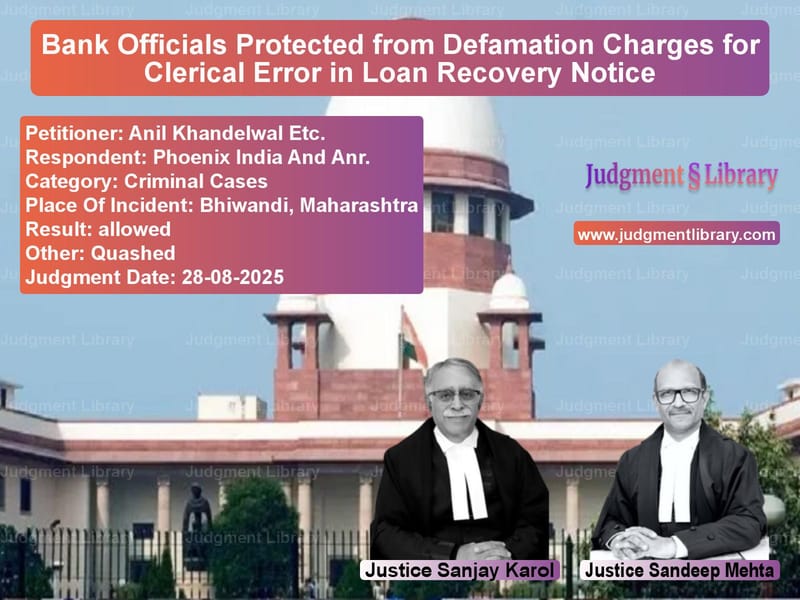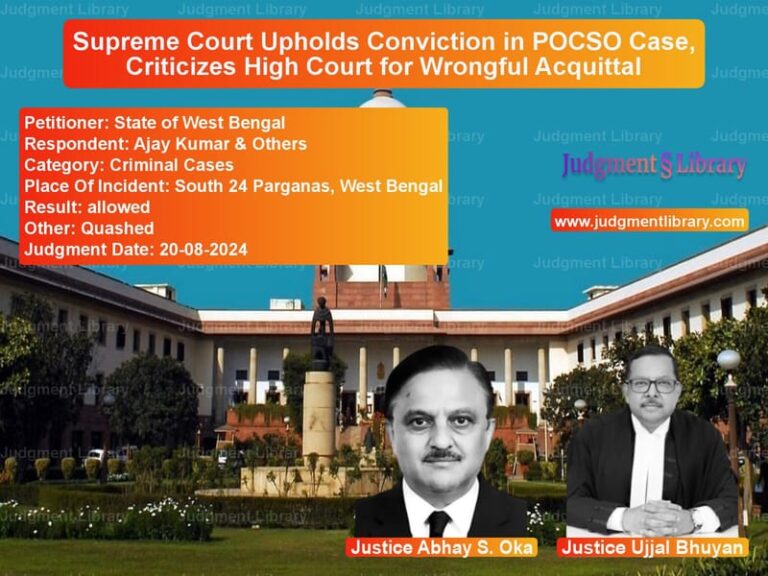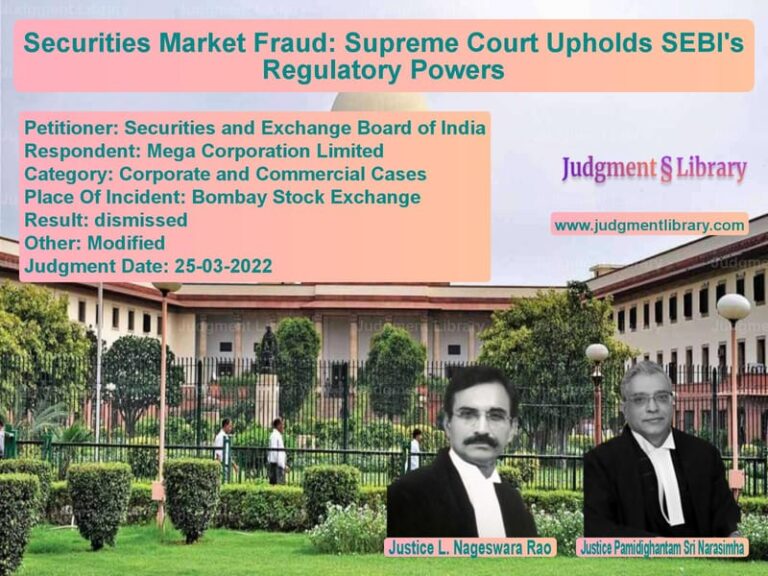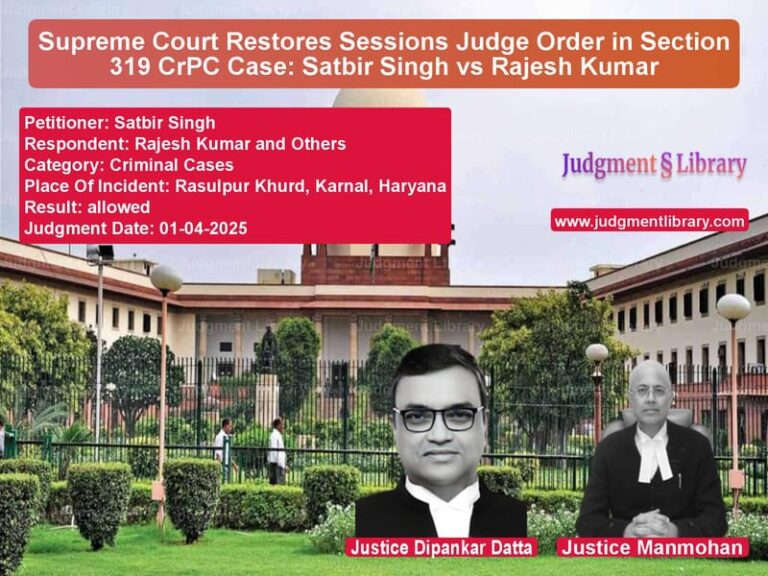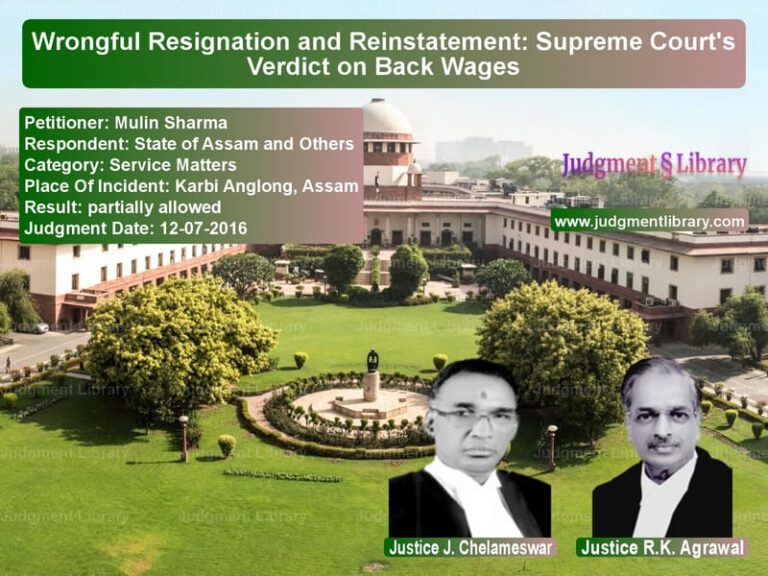Bank Officials Protected from Defamation Charges for Clerical Error in Loan Recovery Notice
In a significant judgment that protects banking officials from criminal prosecution for bona fide errors in loan recovery proceedings, the Supreme Court has quashed defamation cases against senior bank officers who were facing criminal charges due to a clerical mistake in a possession notice. The case involved Dr. Anil Khandelwal, then Chairman and Managing Director of Bank of Baroda, and other senior officials who were prosecuted for defamation after a typographical error in a SARFAESI Act notice showed an inflated outstanding amount of Rs. 56 crore instead of the actual Rs. 5.61 crore.
The dispute originated from loan transactions dating back to before 2002, when Phoenix India had availed credit facilities of Rs. 21.34 crore from Bank of Baroda. The firm defaulted on payments from June 2002 onward, leading the bank to classify the account as a non-performing asset. After repeated demands for payment went unheeded, the bank initiated proceedings under the SARFAESI Act in 2007. It was during this recovery process that a crucial clerical error occurred – the possession notice issued under Section 13(4) of the SARFAESI Act mistakenly showed the outstanding amount as Rs. 56,15,9,294 instead of the correct figure of Rs. 5,61,59,294.
Instead of seeking clarification from the bank about this obvious discrepancy, Phoenix India immediately sent a legal notice to the bank officials alleging defamation, claiming that the inflated figure was malicious and intended to harm their reputation. The bank promptly issued a clarification letter on August 7, 2007, expressing regret for the clerical error and correcting the amount. However, unsatisfied with this explanation, the firm filed a criminal complaint before the Judicial Magistrate First Class in Bhiwandi, which issued process against the bank officials for offences under Sections 500 and 501 of the Indian Penal Code.
The bank officials approached the Bombay High Court seeking quashing of the complaint, but their petitions were dismissed, leading them to appeal to the Supreme Court. The apex court, in a strongly worded judgment, came down heavily on what it termed as “gross abuse of process of law.”
Vicarious Liability Cannot be Applied Under IPC
The Supreme Court made several crucial legal observations that have far-reaching implications for corporate criminal liability. The Court emphasized that “the Bank itself, on whose behalf the alleged defamatory notice had been issued, was not arraigned as an accused in the complaint. It is a settled position of law that without impleading the company itself, the prosecution against directors or officers alone is impermissible.”
Referring to its earlier judgment in Aneeta Hada vs. Godfather Travels and Tours (P) Ltd., the Court reiterated that “prosecution of the directors or officers of a company can be maintained only when the company itself is arraigned as an accused and additionally, the directors or officers must have acted in a manner that directly connects his/her conduct to the company’s liability. In the absence of the company being impleaded as an accused, its directors or officers cannot be fastened with vicarious liability for offences attributable to the company.”
The Court made a crucial distinction between the Indian Penal Code and special statutes, observing that “there is no concept of vicarious liability of the officers or directors for the offences under the IPC as is provided under special Penal Statutes such as The Negotiable Instruments Act, 1881, The Food Safety and Standards Act, 2006, The Drugs and Cosmetics Act, 1940, etc. which specifically creates such liability.”
No Automatic Prosecution Based on Designation
The judgment strongly criticized the tendency to automatically prosecute senior officials merely based on their designation. The Court quoted from its earlier decision in Maksud Saiyed vs. State of Gujarat, where it was observed that: “The Penal Code does not contain any provision for attaching vicarious liability on the part of the Managing Director or the Directors of the Company when the accused is the Company. The learned Magistrate failed to pose unto himself the correct question viz. as to whether the complaint petition, even if given face value and taken to be correct in its entirety, would lead to the conclusion that the respondents herein were personally liable for any offence.”
The Court emphasized that “before any officer of a Bank or a body corporate can be prosecuted for an offence under the IPC on the allegation of having acted on behalf of the institution, it is incumbent upon the complainant to produce unimpeachable material indicating the precise role of the officer in the commission of the alleged offence. Mere bald assertions of vicarious liability, without foundational facts to show active participation, authorization, or deliberate omission on the part of the officer, are insufficient to justify issuance of process in such a situation.”
Judicial Process Should Not Be Used for Harassment
The Supreme Court expressed serious concern about the misuse of criminal proceedings to harass bank officials performing their statutory duties. Quoting from Punjab National Bank vs. Surendra Prasad Sinha, the Court noted: “It is also salutary to note that judicial process should not be an instrument of oppression or needless harassment. The complaint was laid impleading the Chairman, the Managing Director of the Bank by name and a host of officers. There lies responsibility and duty on the Magistracy to find whether the concerned accused should be legally responsible for the offence charged for.”
The Court further emphasized that “Only on satisfying that the law casts liability or creates offence against the juristic person or the persons impleaded then only process would be issued. At that stage the court would be circumspect and judicious in exercising discretion and should take all the relevant facts and circumstances into consideration before issuing process lest it would be an instrument in the hands of the private complaint as vendetta to harass the persons needlessly.”
Protection Under SARFAESI Act
The judgment also highlighted the statutory protection available to bank officials under the SARFAESI Act. The Court noted that “the appellants are entitled to the statutory protection provided under Section 32 of the SARFAESI Act, which expressly prohibits any suit, prosecution, or other legal proceedings against the Reserve Bank, the Central Registry, any secured creditor, or their officers for anything done in good faith pursuant to the provisions of the Act.”
The Court found that “Manifestly, the possession notice dated 13th June, 2007 was bona fide issued under Section 13(4) of the SARFAESI Act for taking symbolic possession of the mortgaged property on account of default in repayment of outstanding dues. Owing to a clerical error in the drafting of the notice, instead of reflecting the true outstanding amount as Rs.5,61,59,294/-, the recovery notice portrayed the amount as Rs.56,15,9,294/-. Upon realizing this inadvertent mistake, the Bank promptly issued a clarificatory letter on 7th August, 2007, expressing regret and rectifying the figure.”
This sequence of events, according to the Court, “clearly establishes that the acts/omissions of the Bank and its officials were bona fide, in due discharge of statutory duties under the SARFAESI Act, without any mala fide intention to defame respondent No.1- firm.”
Broader Implications for Banking and Corporate Sector
This judgment has significant implications for the banking sector and corporate governance in India. By quashing the criminal proceedings against the bank officials, the Supreme Court has sent a strong message that bona fide errors in the discharge of statutory duties should not lead to criminal prosecution, especially when there’s no evidence of malicious intent.
The judgment protects banking officials from being personally targeted for operational errors in loan recovery processes. This is particularly important given the increasing number of non-performing assets in the banking system and the necessary recovery actions that banks must undertake.
The Court’s clear distinction between the Indian Penal Code and special statutes that specifically provide for vicarious liability provides much-needed clarity for corporate officials. It establishes that unless a statute specifically creates vicarious liability, officials cannot be automatically prosecuted for organizational actions.
The judgment also reinforces the importance of following proper legal procedure in corporate prosecutions. The requirement to implead the company as an accused before prosecuting its officers, as established in the Aneeta Hada case, has been reaffirmed, providing an important procedural safeguard for corporate officials.
Furthermore, the Court’s observations about judicial process not being used as an instrument of harassment serve as a warning against frivolous litigation aimed at pressuring bank officials in recovery proceedings. This is crucial for maintaining the efficiency of the banking system and ensuring that recovery processes are not hampered by fear of personal liability.
The protection under Section 32 of the SARFAESI Act, as interpreted by the Court, provides significant immunity to banking officials acting in good faith while discharging their statutory duties under the Act. This ensures that officials can perform their recovery functions without constant fear of criminal prosecution for bona fide errors.
In conclusion, the Supreme Court’s judgment strikes a careful balance between protecting the rights of borrowers and ensuring that banking officials can perform their recovery functions without undue harassment. By quashing the defamation cases and providing clear guidelines on corporate criminal liability, the Court has strengthened the legal framework for banking operations while preventing the misuse of criminal law in commercial disputes.
Petitioner Name: Anil Khandelwal Etc..Respondent Name: Phoenix India And Anr..Judgment By: Justice Sanjay Karol, Justice Sandeep Mehta.Place Of Incident: Bhiwandi, Maharashtra.Judgment Date: 28-08-2025.Result: allowed.
Don’t miss out on the full details! Download the complete judgment in PDF format below and gain valuable insights instantly!
Download Judgment: anil-khandelwal-etc.-vs-phoenix-india-and-an-supreme-court-of-india-judgment-dated-28-08-2025.pdf
Directly Download Judgment: Directly download this Judgment
See all petitions in Criminal Defamation
See all petitions in Banking Regulations
See all petitions in Corporate Governance
See all petitions in Debt Recovery
See all petitions in Fraud and Forgery
See all petitions in Judgment by Sanjay Karol
See all petitions in Judgment by Sandeep Mehta
See all petitions in allowed
See all petitions in Quashed
See all petitions in supreme court of India judgments August 2025
See all petitions in 2025 judgments
See all posts in Criminal Cases Category
See all allowed petitions in Criminal Cases Category
See all Dismissed petitions in Criminal Cases Category
See all partially allowed petitions in Criminal Cases Category

